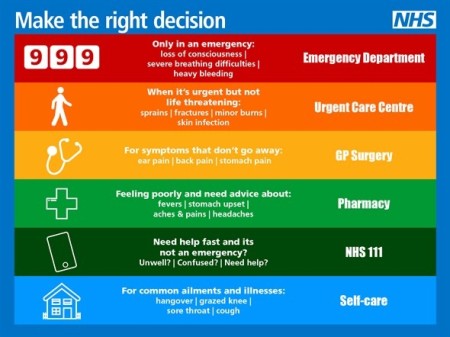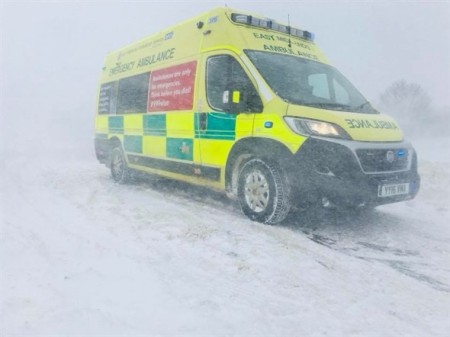Plans are well underway to ensure that everyone here at EMAS is ready for another busy winter period.
Throughout 2019, we have seen a 6% increase in demand compared to 2018, and we expect this to continue throughout the winter period.
Since last winter, we have welcomed almost 300new staff members to our frontline teams, many of whom will be out on the road in time for our busiest period.
Ongoing transformation of services and work with NHS and care system partners to operate more effectively will continue to support specific winter-related moves to cut 999 calls and journeys to accident and emergency departments.
Throughout the year, our Fleet team have focused on replacing some of our older vehicles which have reached the end of their working lives, and so the average age of one of our ambulances is just three years’ old. Furthermore, all our ambulances are now less than seven years old. This will help us respond more quickly and more consistently to 999 calls, and provides a more comfortable environment for our patients and colleagues.
Chief Executive Richard Henderson said: “The whole health system continues to be under immense pressure and so we know that we will continue to be busy throughout this winter.
“This means that at times we will have to prioritise patients, treating those with urgent and immediately life-threatening injuries and conditions first and asking others to wait until crews become available.
“We will have additional staff out on the road and in our 999 control room on key dates which where we anticipate demand to be especially high, and will deploy mobile treatment centres to specific locations to help reduce pressures on the NHS system.
“We continue to work with all hospitals across our region to reduce delays when handing over patients at accident and emergency departments so that our vehicles are back out on the road as soon as possible.
“We are working closely with GPs and our hospital and community health trust partners to reduce the number of people we take to accident and emergency by establishing and clarifying alternative pathways.
"We are supporting our staff to help keep them healthy at work and out on the road during what we expect to be a sustained period of high demand.
“However, we also need the public to play their part by taking self-care seriously, and if they need medical assistance, by ensuring they are accessing the best, quickest and most appropriate places to get the help they need - for example visiting a pharmacist or their local urgent treatment centre.”

As in previous years, we are particularly preparing for increased demand during December and January, especially on the day many refer to as Black Friday (20 December), New Years’ Eve and New Years’ Day.
On average, our 999 control room receives 2,147 calls every day. However, last winter we took 3,185 calls on ‘Black Friday’, 2,749 calls on New Years’ Eve, and 3,519 calls on New Years’ Day.
Richard Henderson added: “We want to make sure that our highly-skilled ambulance crews are able to be there for patients who really need us, such as those who are experiencing a stroke or who are having a heart attack.
“To help enable us to do this, please make sure you are only calling for an ambulance in a genuine emergency.
“I am confident we have plans in place to ensure we are working as effectively as possible as a trust and as part of the health and care system, and I trust that our patients will make the right choices when accessing healthcare services.
“Furthermore, our longer-term plans will put us in a stronger position as we head for 2020.
“I would like to take the opportunity to thank all of our incredible staff who will be going the extra mile this winter to ensure our patients get the help they need.”
Other plans in place to help us manage the winter demand include additional resources from private ambulance services, reviewing our 4x4 availability ahead of expected inclement weather, and we are in early conversations with St John Ambulance to provide additional alcohol intoxication services in city centres.
As a service, our communications team will be supporting national NHS projects, such as:
- Choosing the most appropriate service (#ChooseWell)
- Self-care and maintaining personal health (#StayWell)
- Flu vaccinations
- NHS 111 and NHS111 online
- GP surgery extended opening times.

Each of our divisions have developed robust plans to further support their geographical regions, our resourcing teams continue to work seven days a week, and each division has a 24/7 tactical cell consisting of additional managers who will be focusing on increases in demand. Some of the local initiatives are described below;
Division-specific plans
Lincolnshire: We worked closely with the organisers and healthcare providers at the Lincoln Christmas Market to ensure we provided a good service to our patients despite the additional visitors to the area.
We also continue to work closely with LIVES and other local organisations to make sure our services are as robust as they can be going into winter.
Northamptonshire: We are working in partnership with Northampton General Hospital to have an advanced nurse practitioner and a paramedic in the city centre on key dates including Christmas Eve and New Year’s Eve.
Leicestershire: On key dates we will have a POLAMB (joint police and ambulance vehicle) operating in the city centre, staffed by EMAS clinicians and Leicestershire Police. They will be treating patients with minor injuries to avoid unnecessary ambulance call outs and hospital admissions. We will also be running an alcohol reduction scheme in the city centre.
You may also have seen in the media that Leicester Royal Infirmary will be providing a facility close to their emergency department for some patients arriving on ambulances to wait until they are admitted for further assessment. This will allow ambulances to get back on the road to respond to emergency calls and reduce some of the extensive handover delays we have seen recently.
We are finalising the operational details together with the hospital, but expect that this facility will be open before Christmas.
Nottinghamshire: On Black Friday and Saturday (20 and 21 December), we will have a St John Ambulance, staffed by their ambulance crews and an Emergency Care Practitioner, based in Market Square to treat patients who suffer minor illness or injuries. This initiative will also be in place on certain dates throughout the Christmas and New Year period.
A POLAMB will be based in Mansfield town centre on New Year’s Eve.
Derbyshire: Our management team have been working with mountain rescue and our local resilience forum to ensure we can reach our patients in the more remote parts of Derbyshire even when the winter weather arrives. We have a range of specialist vehicles at our disposal both within the service and from our partner agencies, including our brand new Amarok vehicle.
In Derby City Centre, our colleagues will be working with St John Ambulance and the street pastors on 20 and 21 December, as well as on Christmas Eve and New Year’s Eve, to help reduce unnecessary ambulance call outs in the area.
What you can do to help
- Take self-care seriously – do everything to keep yourself healthy including keeping your home heated to 18C, have regular hot meals and drinks, and wear a few layers of thin clothing rather than one thick layer as this will help you to keep warm.
- Have your flu jab if you are eligible
- If you have diarrhoea and vomiting (D&V or norovirus) then please don’t mix in public for 48 hours after the last episode, and definitely don’t visit a hospital unless you’re really ill. If your children have D&V then they should stay away from school.
- Don’t use A&E for minor illness or injury as you might risk the care of people who are seriously ill by diverting staff.
- Know your limits if out celebrating during the festive season, make sure you know how you are getting home, and take responsibility for your actions.
- Call NHS 111 for advice if you don’t know where to go. They will advise you of the best place to go that can help.
- Think about whether you need to visit a service – can the pharmacy help, for example?
- Remember that your GP practice has appointments in the evenings and at the weekend.